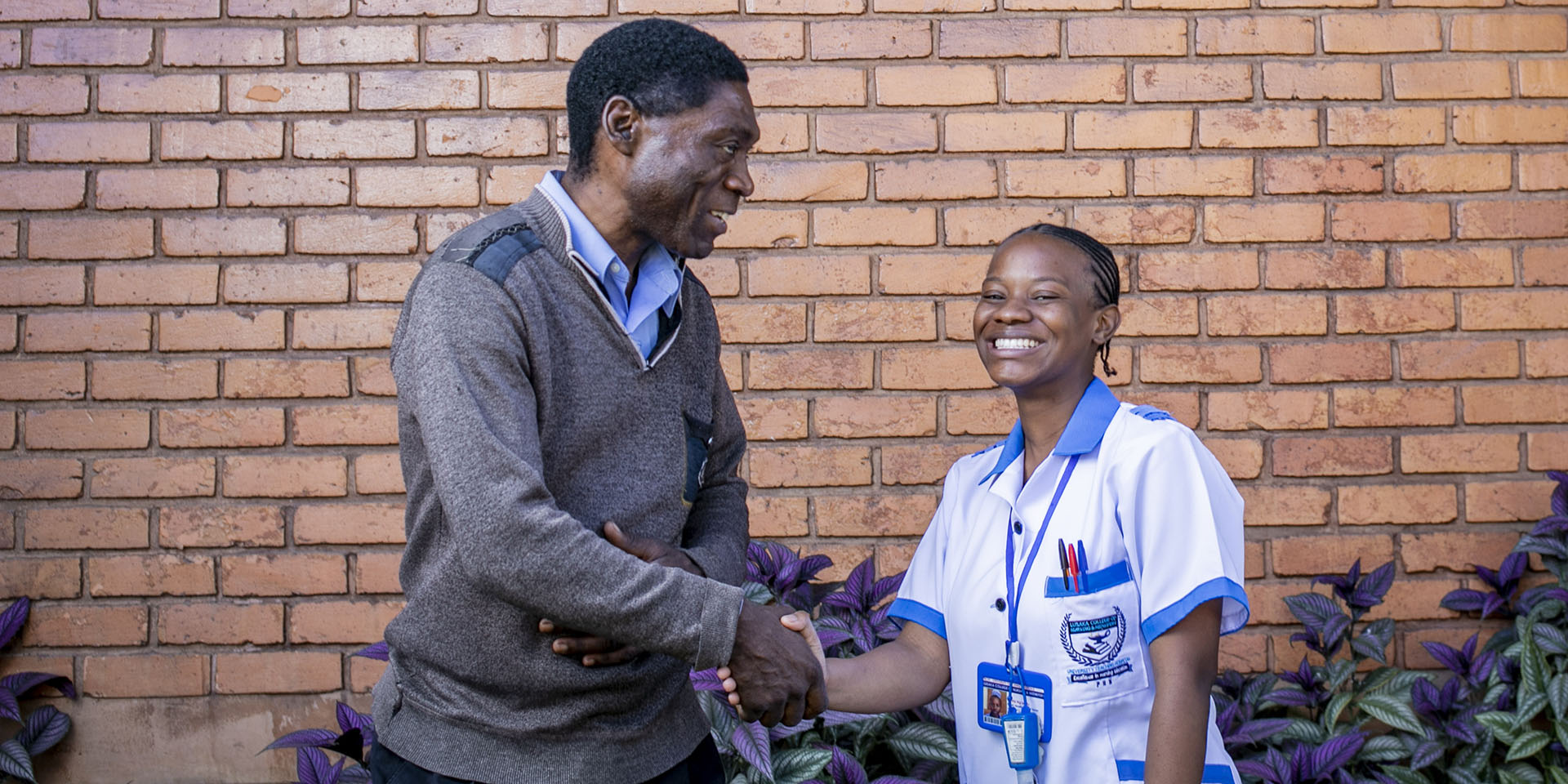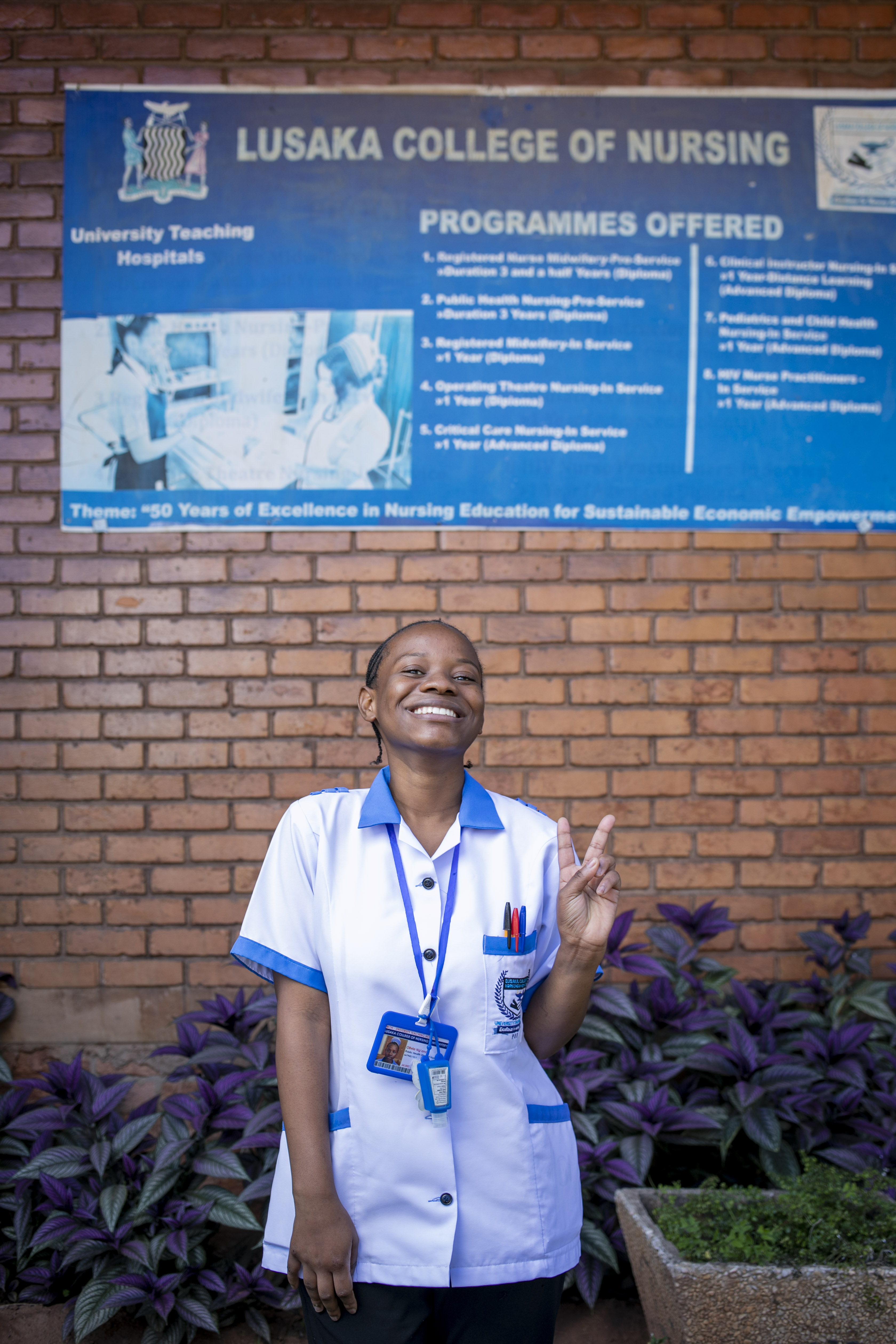
When Olivia was a child growing up in Lusaka South, Zambia, she knew she wanted to work in public health, but becoming a nurse wasn’t an option she considered.
Instead, Olivia had set her sights on a degree in public health and business administration at the University of Zambia (UNZA). She hoped to build a future where she could combine her love for numbers and accounting with her passion for educating others on health issues.
However, life had other plans for her. Financial constraints prevented her from enrolling at UNZA. A full scholarship to study in India provided some hope, but the onset of the COVID-19 pandemic swiftly thwarted those plans. With her dreams looking harder to reach, Olivia searched for an alternative path.
The path she found was to study public health nursing at UNZA’s University Teaching Hospital. Olivia was determined to make the most of the opportunity. Little did she know her nursing journey would unveil a world beyond her initial aspirations. Zambia’s health system was facing challenges in the supply chain due to a lack of supply chain training for health workers, but students like Olivia presented a potential solution.
As part of their health supply chain work in Zambia, the USAID Global Health Supply Chain Procurement and Supply Management (GHSC-PSM) project wanted to address training gaps for health workers along the supply chain. According to Luke Alutuli, Acting Director General for the Zambia Medicines and Medical Supplies Agency (ZAMMSA), “Health facilities and supply chain personnel often lack the skills to accurately predict future demand and coordinate supply chain activities effectively, leading to inefficiencies, stockouts, and overstocking.” Limitations along the health supply chain disrupted service delivery and compromised patient care. A lack of stock managers caused the role of stock management to fall to nurses and pharmacists, who didn’t have the necessary training to know how to quantify commodities, when to order them, and how to avert a stockout of essential medicines.

To address the issue, GHSC-PSM set out to collaborate with UNZA and Nursing and Midwifery Council of Zambia (NMCZ) on a course that would equip undergraduate pharmacy and nursing students with health supply chain management skills while also establishing UNZA as a leader in sustainable professional training and a future for health workers that includes supply chain knowledge as they move into their careers.
“Life is a stepping stone,” Olivia reflected on her journey, “every step you take takes you somewhere.” Her route may not have been what she expected, but her dream of working in public health remains alive and well. Studying public health nursing has influenced her career trajectory, giving her a fresh perspective on nurses' essential role in creating awareness around health issues
“I love speaking and educating others on the knowledge I have,” Olivia shares with a bright smile. “I find it so interesting that I’m a public health nurse because there’s so much educating and creating awareness.” This newfound role has allowed her to merge her passion for educating others with her commitment to health, giving her a deeper sense of fulfillment.
However, she is also acutely aware of the challenges that public health nurses face. “Engaging people, it’s not really easy, especially in rural areas. You have barriers in language due to the different local languages,” she explains. This insight has fueled her determination to bridge these gaps and enhance communication in her work, ensuring that key health messages are shared with even the most remote communities.
Olivia’s understanding of the importance of the health supply chain remains a cornerstone of her education. Her coursework with the curriculum planned by GHSC-PSM, UNZA and NMCZ revealed the connections between supply chains and effective public health.
“When I had the experience with supply chain, I went deeper into understanding what it’s all about,” Olivia recalls. “It’s very important that we work on it because the supply chain is needed everywhere, and getting medicines from the manufacturers to the consumers is very important.”
Now that Olivia is more equipped with her supply chain knowledge, she has taken on the role of an advocate, encouraging her fellow students to recognize its importance and take it seriously. “The more knowledge we have, the more seriously we can take things and the more we know how important [supply chain] is,” she emphasizes. “I think we’ll reach a point where the supply chain is something everyone is aware of, and commodities will be flowing, and we can avoid stockouts.”
The training provided by GHSC-PSM is instrumental in helping USAID achieve its goal of creating sustainable health systems. By training future public health professionals like Olivia, these programs ensure that supply chains are seen as an inextricable part of public health.
As Olivia approaches the end of her undergraduate course, she looks to the future with excitement and determination. Inspired by her principal nurse, who holds a degree in Public Health, Olivia is eager to further her education and begin her career in public health. “I’m going to keep learning and envisioning myself higher and higher,” she declares boldly.
Olivia’s resilience is a testament to the power of education and the importance of seizing unexpected opportunities. Thanks to GHSC-PSM’s collaboration with UNZA and NMCZ, her dreams have taken a new direction with her holistic understanding of the role of supply chains in public health. By institutionalizing health supply chain knowledge, a new generation of health professionals will be better equipped to manage vital health commodities and serve the people who need them most.
